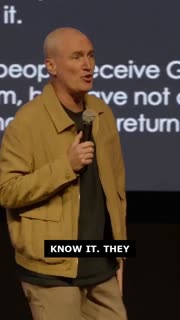Living Out Resurrection: Authentic Faith in Action
Devotional
Sermon Summary
Bible Study Guide
Sermon Clips
1. "We live with a conviction that we're not simply called to go to heaven when we die. We're called to bring heaven to every place we see hell here. And so we use the profit for that to fund our mission in the world. Our mission of choice are homes in China that look after children with disabilities." [00:45] (13 seconds)
2. "Loving someone is treating someone as they are worth and never as they deserve. And I really, really appreciate you guys. You guys should be honored heavily for what you did tonight to bend over backwards to make me look okay up here. Thank you very, very much." [05:15] (13 seconds)
3. "Have we turned Jesus into an argument to win instead of a life of love to demonstrate? And that's what I want to talk to you about tonight. Twenty-five years of doing, of doing this thing and you guys are amazing at it and you're my family. And so I want to talk to you like a family member tonight instead of a guest." [07:55] (18 seconds)
4. "Some people know it. They just can't name it. Ten years ago, there's a guy named Sean Penn. Sean Penn is Madonna's ex-husband and he sold everything he owned in Beverly Hills. And moved to Haiti and gave it all to the poor, which is quite inspiring. When the news asked him, what inspired you to do this? His answer was, I can't name it, but there was an internal hum deep in my heart urging me to live my life for other people. And I knew I had to say yes." [10:05] (30 seconds)
5. "The world is infinitely better now because of the work of the Spirit of Christ. People say, man, the world these days. Man, nothing's worse today than back then. Nothing's worse today than 100 years ago. You imagine your great-great-grandfather coming back from the dead and you had two days to convince him the world's worse today. Oh, great-granddad, you don't know how hard it is. Everything's better." [17:47] (19 seconds)
6. "Jesus is not someone to believe in. Demons believe in Jesus. Jesus is somebody to fundamentally shift the way we see everything. Some people know it. They just can't name it. Some people name it too loud. But when you look at their life, they just don't know it. Some people have received God's offering for them. When you look at their life, they haven't really offered anything good back." [31:01] (26 seconds)
7. "Jesus has given his life for us. But what's our offering back? How does our anger smell? Jesus said six things endanger someone's life of Gehenna. Hell, anger, lust, calling people idiots. Do you drive in Auckland much? Auckland's a great place. The only problem with Auckland is whoever invented the road stop, no one would show up. Pride, apathy, and greed." [41:58] (34 seconds)
8. "May we be known for our demonstrations of love instead of our announcements of doctrine. May we be people who know that Jesus' way is enough and be brave enough to live it. Until I see you next time, grace and peace everybody." [47:37] (16 seconds)
Ask a question about this sermon
2. "Loving someone is treating someone as they are worth and never as they deserve. And I really, really appreciate you guys. You guys should be honored heavily for what you did tonight to bend over backwards to make me look okay up here. Thank you very, very much." [05:15] (13 seconds)
3. "Have we turned Jesus into an argument to win instead of a life of love to demonstrate? And that's what I want to talk to you about tonight. Twenty-five years of doing, of doing this thing and you guys are amazing at it and you're my family. And so I want to talk to you like a family member tonight instead of a guest." [07:55] (18 seconds)
4. "Some people know it. They just can't name it. Ten years ago, there's a guy named Sean Penn. Sean Penn is Madonna's ex-husband and he sold everything he owned in Beverly Hills. And moved to Haiti and gave it all to the poor, which is quite inspiring. When the news asked him, what inspired you to do this? His answer was, I can't name it, but there was an internal hum deep in my heart urging me to live my life for other people. And I knew I had to say yes." [10:05] (30 seconds)
5. "The world is infinitely better now because of the work of the Spirit of Christ. People say, man, the world these days. Man, nothing's worse today than back then. Nothing's worse today than 100 years ago. You imagine your great-great-grandfather coming back from the dead and you had two days to convince him the world's worse today. Oh, great-granddad, you don't know how hard it is. Everything's better." [17:47] (19 seconds)
6. "Jesus is not someone to believe in. Demons believe in Jesus. Jesus is somebody to fundamentally shift the way we see everything. Some people know it. They just can't name it. Some people name it too loud. But when you look at their life, they just don't know it. Some people have received God's offering for them. When you look at their life, they haven't really offered anything good back." [31:01] (26 seconds)
7. "Jesus has given his life for us. But what's our offering back? How does our anger smell? Jesus said six things endanger someone's life of Gehenna. Hell, anger, lust, calling people idiots. Do you drive in Auckland much? Auckland's a great place. The only problem with Auckland is whoever invented the road stop, no one would show up. Pride, apathy, and greed." [41:58] (34 seconds)
8. "May we be known for our demonstrations of love instead of our announcements of doctrine. May we be people who know that Jesus' way is enough and be brave enough to live it. Until I see you next time, grace and peace everybody." [47:37] (16 seconds)








